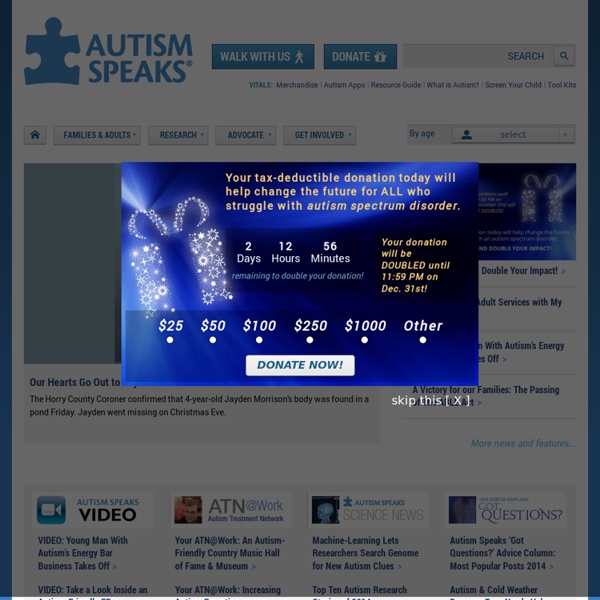



Time Management Tips - Time Management Tips for ADHD Time Management Tips and Adult ADD I’m running late. I’ll be there in just a little while. I am so sorry that I am late. How many times have you said these words? It feels terrible to be late -– to work, to your doctor's appointment, to your meeting, to meet a friend, getting the kids to school, and even worse, picking the kids up from school. Visual Impairment Listen The human eye is like a camera that collects, focuses, and transmits light through a lens to create an image of its surroundings. In a camera, the image is created on film or an image sensor. In the eye, the image is created on the retina, a thin layer of light-sensitive tissue at the back of the eye. Like a camera, the human eye controls the amount of light that enters the eye. The iris (the colored circular part of the eye) controls the amount of light passing through the pupil.
Teaching Students with Disabilities Mission of the Disabled Students' Program Responsibilities of the Disabled Students' Program Responsibilities of the Instructor Responsibilities of the Student General Suggestions on Teaching Students with Disabilities Teaching Students with Autism Spectrum Disorders Teaching Students with Chronic Illness or Pain Teaching Students Who are Deaf or Hard of Hearing Teaching Students with Learning Disabilities Teaching Students with Attention-Deficit/Hyperactivity Disorder Teaching Students with Limited Manual Dexterity Teaching Students with Mobility Impairments Teaching Students with Psychological Disabilities Teaching Students with Speech Impairments Teaching Students with Visual Disabilities How DSP Can Assist Instructors at UC Berkeley Mission of the Disabled Students' Program A note about our usage of the words "disabled" and "disability": In law, University policies, and common parlance, terms like "disabled" and "disability" have a variety of meanings, many of which are contextual.
For teachers / educators 1001 Great Ideas for Teaching and Raising Children with Autism Spectrum Disorders by Veronica Zysk and Ellen Notbohm Parents and professionals can now bypass countless hours spent seeking answers to the mystifying day-to-day challenges of autism. In a snappy, can-do format, this insightful book offers page after page of try-it-now solutions that have worked for thousands of children grappling with social, sensory, behavioral, and self-care issues, plus many more. Autism Island: 50 things you SHOULD say to autism parents. I received many comments wondering when I was going to post 50 things you should say to autism parents like I promised. Here is one comment that I think sums up how many people feel “I do not have autistic children. Most of the things on this list sound horrible. Some of the things I think are people trying to make conversation and simply understand your world better. How about creating another list of things you’d prefer to hear people say?
Auditory Processing Disorders By: National Center for Learning Disabilities (NCLD) Introduction Visual and auditory processing are the processes of recognizing and interpreting information taken in through the senses of sight and sound. The terms, "visual and auditory processing" and "visual and auditory perception", are often used interchangeably. Although there are many types of perception, the two most common areas of difficulty involved with a learning disability are visual and auditory perception. Guidelines for teaching students with disabilities Many teaching strategies that assist students with disabilities are also known to benefit students without disabilities. Instruction provided in an array of approaches will reach more students than instruction using one method. DS offers the following suggestions to assist instructors in meeting the growing diversity of student needs in the classroom, particularly those with disabilities.
Books for parents & caregivers The Autism Sourcebook: Everything You Need to Know About Diagnosis, Treatment, Coping, and Healing by Karen Siff Exkorn When Karen Siff Exkorn's son, Jake, was diagnosed with autism, she struggled to pull together comprehensive information about the disorder. Fortunately, she was able to educate herself quickly, and her extensive at-home treatment of her son led to his amazing full recovery.